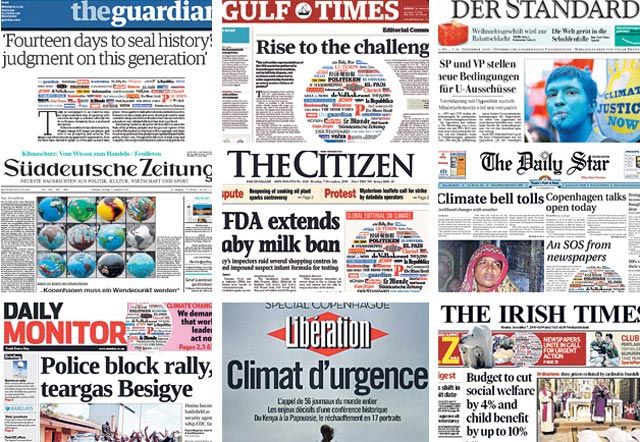From China to Canada, Ireland to India and Miami to Moscow, 56 leading newspapers in 45 countries spoke as one yesterday — sending a clarion call to the world's political leaders to strike a deal of climate change in Copenhagen.
In what is considered to be a first in print journalism, the newspapers ran a single common editorial urging international leaders to make "the right choice" in combatting global warming.
In much the same way as television stations plan a simulcast, it took weeks of planning and coordination for the common editorial project to happen. But why speak as one now?
"We in Gulf News consider environmental issues to be among our top priorities on the editorial agenda," explained Abdul Hamid Ahmad, Editor-in-Chief at this paper.
"We have been reporting extensively on environment, global warming, climate change and how all of these affect us long before Copenhagen became the byword for climate change action," he said.
"We have demonstrated our commitment to prevent climate change and global warming through pioneering campaigns such as Go Green and Wipe Out Waste, and environmental issues have always been a key part of our editorial coverage."
"As a media group that caters to a wide variety of readership and cultures, I believe that it is our responsibility to draw attention to the way the planet and the environment in which we live is changing for the worse, raise awareness about what we could do to stop it, and spur global action," Ahmad said.
"I also believe that nothing can help nations come together more than environmental issues, because the air that we breathe and the earth that we live in are the same. This is the common thread that binds all nations together, political and ideological differences notwithstanding: we are nothing without a sustainable planet to live in.
"The Copenhagen summit is a great opportunity for the world to take action against the changes that are harming the environment. And developed nations, industrialised nations, must take charge to bring about this change. This doesn't mean that other nations should abdicate all responsibilities, but that those who have been at the forefront of industrial growth across the world must be at the forefront of mitigating the environmental risk that comes with it," Ahmad said.
That's a sentiment echoed by senior newspaper editors around the globe. The Toronto Star has long been at the front line, crusading for climate change. "Climate change is the defining issue of our age," Star Editor Michael Cooke said, explaining the Star's decision to join newspapers worldwide in stressing the need for decisive action.
"The Toronto Star has crusaded for more than a century for social justice," Cooke said.
"And what," he asked, "could be more important for our children and grandchildren than to fight for a clean and healthy planet? "The Star is proud to add its voice to progressive newspapers around the world in demanding immediate and courageous action from our Prime Minister and other world leaders."
The Guardian deputy editor Ian Katz, who co-ordinated the project, said "The fact that papers from Moscow to Miami, with such different national and political perspectives, could agree on an editorial should offer some hope that our leaders might be able to do the same. We are bombarded with so much news and comment about climate change that many people are understandably tempted to go back to bed and pull the duvet over their heads — hopefully this improbable alliance will capture people's attention, and perhaps their imagination too."
There are also 11 African papers participating, and nine from north, south and central America combined.
The sole English-language US paper represented is the Miami Herald. "This initiative offered the Miami Herald's editorial board a terrific opportunity to join other papers across the globe on an issue that is of paramount importance to Florida and to our nation," said the Herald's editorial page editor, Myriam Marquez.
The 20 European papers taking part include the Irish Times, Liberation, Suddeutsche Zeitung, La Repubblica and Turkish title Hurriyet. And delegates in Copenhagen will find that two Danish papers, Dagbladet Information and Danish Politiken, are featuring the leader too.
Some papers, such as Japan's Asahi Shimbun, were not able to carry a shared leader as that would breach their editorial protocols but are carrying a news report about the initiative. Two Australian papers, The Age and the Sydney Morning Herald, pulled out at a late stage after the election of climate change sceptic Tony Abbott as leader of the opposition Liberal party recast the country's debate on green issues.
Tremendous initiative
Peter Cole, head of the journalism department at the University of Sheffield, praised the unprecedented collaboration between newspapers.
"This is a tremendous initiative and a good counter to the idea that nobody notices that the world is falling apart," he said. "If editors from nearly 50 countries all over the world, including all the major countries that contribute so much to global warming, can all agree, then surely the politicians in Copenhagen would be foolish to ignore it."
"Only one year ago, during the COP 14 summit in Poznan, governments promised us that they would deliver a breakthrough," said Konrad Niklewicz of Poland's Gazeta Wyborcza.
"Yet as the Copenhagen summit approached, their courage and leadership started to disappear. Politicians started to behave as we had plenty of time and no disaster looming. Yet the opposite is the case.
"Science tells us we have no more time, it is now or never. We can't let governments get away with yet another fudge and unfulfilled promises. Speaking with one voice, we will be heard."
N Ram, editor-in-chief and publisher of India's Hindu, added: "This is a splendid initiative, and with some luck and a lot of hard work it should turn out to be a significant media intervention, an example of how we can perform our social responsibility function."













